As the temperatures drop, you may wonder about the performance of lithium batteries in cold weather. Do lithium batteries freeze below 0°C? What happens to their capacity and efficiency? Understanding these aspects is crucial for anyone relying on lithium batteries for their devices, especially in outdoor or extreme conditions. In this article, we'll delve into how lithium batteries perform in cold weather, explore storage tips, and highlight the best options for cold-weather use.
Table of Content
Do Lithium Batteries Freeze?
Lithium batteries are renowned for their efficiency, longevity, and lightweight properties. However, their performance can be affected by extreme cold. When the temperatures drop below freezing, the chemical reactions within a lithium battery will slow down, which can impact its ability to deliver power effectively.
Lithium batteries do not freeze in the traditional sense. However, their performance can degrade in cold conditions. Generally, lithium batteries can operate in temperatures as low as -20°C (-4°F), but their capacity can drop significantly at these low temperatures, making it less reliable for powering devices.
Impact of Cold Weather on Lithium Battery Performance
When exposed to cold weather, several factors can influence lithium battery performance:
- Reduced Capacity: As mentioned, cold temperatures can reduce the activity of lithium ions of a battery, resulting in increased resistance, then lead to a reduction in capacity temporarily.
- Voltage Drop: Cold weather can cause the voltage output of a lithium battery to drop faster than usual, which may result in devices shutting down or functioning improperly.
- Slower Charging: Charging a lithium battery in cold conditions can be less effective. If the temperature is below 0°C (32°F), charging should be avoided, which can permanently damage the battery.
- Self-Discharge Rate: Lithium batteries have a low self-discharge rate, but this can increase in cold conditions. If a battery is stored for a long time in cold weather without being used, it may lose its charge faster than expected.
How to Store Lithium Batteries in Cold Weather?
Proper storage of lithium batteries in cold weather is essential to maximize their lifespan and performance. Here are some best practices:
1. Store in a Moderate Temperature
When you are not using your lithium batteries in cold weather, keep them in a controlled environment. Ideally, they should be stored at temperatures between 10°C (50°F) and 35°C (95°F). If you must store them in a cold environment, consider insulating the battery or placing it in a warmer area when not in use.
2. Charge Before Storing
Before storing lithium batteries for extended periods, ensure they are charged to around 50% level. This charge level is optimal for maintaining battery health during storage. It’s recommended to recharge the batteries every three months to ensure they’re in good health. Avoid storing fully charged or fully depleted batteries, as both conditions can lead to a shorter lifespan.
3. Keep Batteries Dry
Ensure that batteries are stored in a dry environment, and avoid exposing them to rain or snow. Use waterproof battery box or case when transporting battery in wet conditions. Consider Redodo batteries which feature IP65 rated and enhanced moisture-proof to withstand harsh outdoor conditions.
4. Monitor Battery Health
Using a battery monitor to regularly check the health of your lithium batteries, especially if they've been stored for a while. If a battery appears compromised, dispose of it properly and do not attempt to use it.
Read More: How to Store LiFePO4 Batteries
Are Lithium (LiFePO4) Batteries Good in Cold Weather?
While no battery performs perfectly in cold weather, lithium batteries perform much better than lead-acid and other types of batteries. For example, lithium batteries maintain a higher discharge capacity in cold weather compared to lead-acid batteries. Some advanced lithium batteries with low-temp cutoff or self-heating function allow them to maintain better performance. Thus, when considering an upgrade to overcome battery issues in cold weather, lithium is the better option.
Related Reading: Self-Heating VS Low-Temp Protection
Best Lithium Batteries for Cold Weather
If you're looking for a reliable LiFePO4 lithium battery that performs well in cold weather, you've found it! The following Redodo LiFePO4 batteries with an advanced BMS that includes low-temperature protection and heating functions, making them the best lithium batteries for cold weather.
12V 140Ah Bluetooth Lithium Battery
The battery is built in a Group 31 size and offers an impressive 40% more capacity than standard models, providing you with 1920W high power for demanding applications. The integrated Bluetooth connectivity allows for real-time monitoring through Redodo mobile app, so you can easily know the information including battery status, voltage, capacity, etc. Additionally, its low-temperature protection ensures the battery life is not damaged by cold temperatures. This makes it a top choice for outdoor activities and RVs.
12V 100Ah Group 24 Smart Bluetooth LiFePO4 Battery
Featuring smart Bluetooth technology, this battery offers real-time monitoring and management through an app, allowing you to track performance metrics like charge level and health status. Its compact Group 24 design makes it suitable for various applications, from RVs to portable power stations. This Group 24 Bluetooth battery also includes low temp cutoff protection, ensuring dependable performance even in cold conditions.
We also offer a Group 31 size battery with the same Bluetooth monitoring and low-temperature protection features.
12V 200Ah LiFePO4 Lithium Battery with Low-temp Protection
Offering a substantial capacity of 200Ah, this deep cycle battery is designed for extended use, making it perfect for applications that demand high power over longer periods. Compare with the typical 12V 200Ah lithium battery, this model increases extra low-temperature protection. It is ideal for off-grid living, solar power systems, and marine usage in cold climates, while ensuring you have the enough power you need for your adventures.
12V 100Ah Self-Heating Lithium LiFePO4 Battery
This innovative self-heating battery is engineered to maintain optimal performance in frigid temperatures. The built-in heater is equipped with 100W dual heating pads. This self-heating function automatically activates when the temperature of battery drops below 41°F (5°C). Once the temperature hits 50°F (10°C), heating stops, and the charing to the battery resumes normally. This revolutionary technology ensures effortless charging in cold environments.
12V 100Ah Lithium LiFePO4 Trolling Motor Battery
Designed specifically for marine trolling motors, this battery is equipped with features that enhance its usability in harsh conditions. It includes low-temperature protection to prevent performance issues in cold weather. The battery also has additional pre-charge functions to ensure safety. The IP65 waterproof rating and salt-spray resistance further extends its durability, making it perfect for marine environments.
FAQs on Lithium Batteries in Cold Weather
How does Redodo's low-temperature protection feature work?
The Redodo low-temp batteries are equipped with an upgraded BMS and a low temperature sensor. This system automatically stops battery charging when it detects that the battery temperature drops below 0°C (32°F) and resumes charging when the temperature rises above 5°C (41°F). When the temperature drops below -20°C(-4°F), the system automatically cuts off the discharge. This feature ensures that these batteries operate safely in cold weather, providing reliable performance for your applications.
How cold is too cold for a lithium battery?
Lithium batteries typically perform well down to about -4°F (-20°C). However, the batteries will not work below this temperature. Prolonged exposure to extreme cold can also lead to potential damage. Therefore, it’s essential to keep the battery at above -4°F (-20°C).
Can I leave a lithium battery outside in winter?
While it's possible to leave a lithium battery outside in winter, it's not recommended. Cold temperatures can reduce the battery's capacity and efficiency. If the battery is stored outside, keep its available capacity above 20%, and store it in a dry environment to minimize risks. For a long-term storage, it is recommended to store the battery indoors at a proper temperature.
What temperature damages a lithium battery?
Extreme temperatures, both hot and cold, can damage lithium batteries. Exposure to temperatures above 122°F (50°C) can lead to overheating, reduced lifespan, and potential safety hazards. Conversely, temperatures below -4°F (-20°C) can impair performance and efficiency, especially if the battery is discharged. When charging, the battery temperature should be above 0°C to ensure safe operation. It's essential to use and store lithium batteries within their recommended temperature ranges for optimal longevity.

Redodo

Redodo
Recent Post

Convert RV from Lead-Acid to Lithium Battery: A Complete Guide

How Long Will a 200Ah Battery Run an Air Conditioner?

A Full Review of Redodo 12V 140Ah Group 31 Deep Cycle Battery

How Much Does it Cost to Replace Golf Cart Batteries?

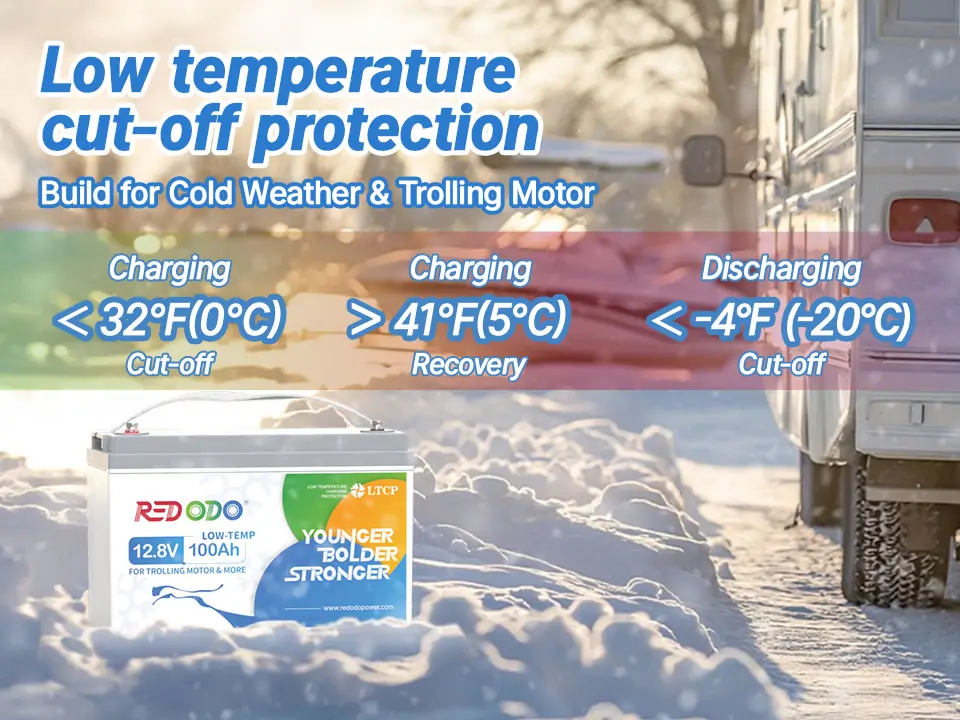
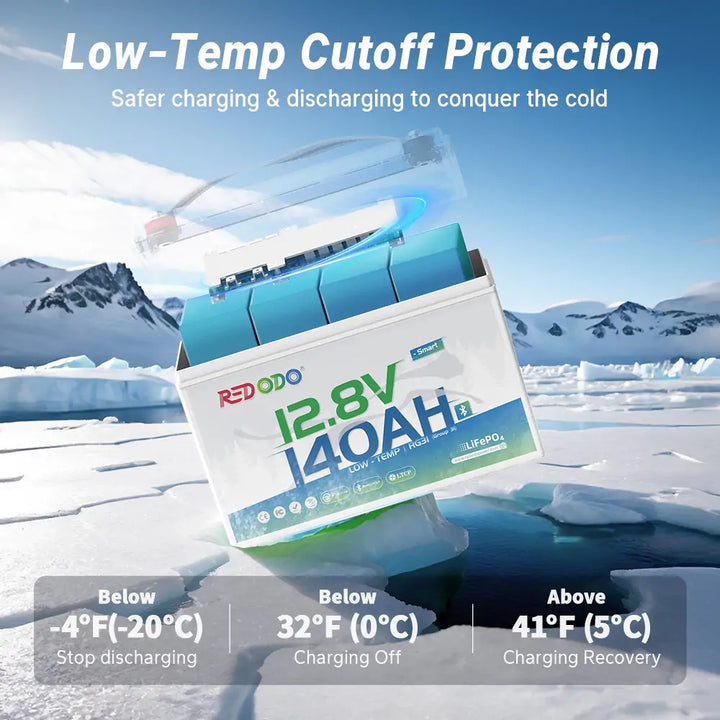
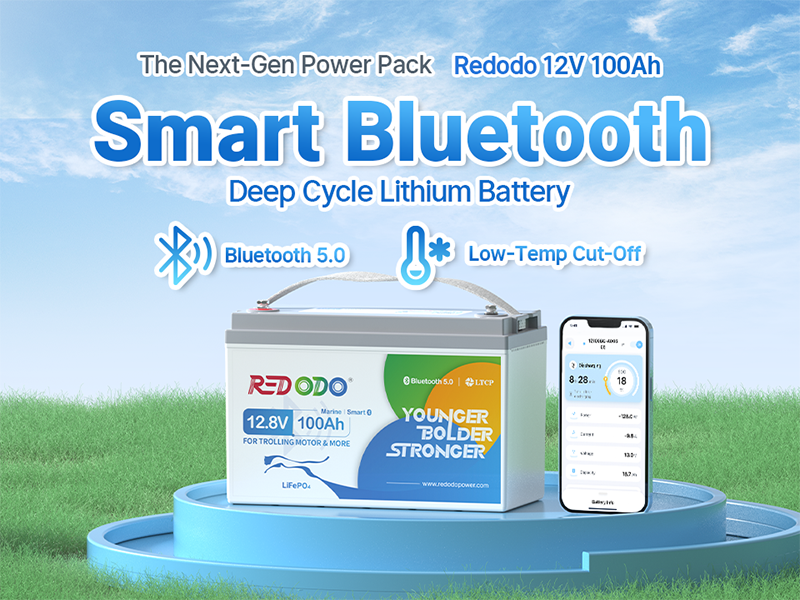
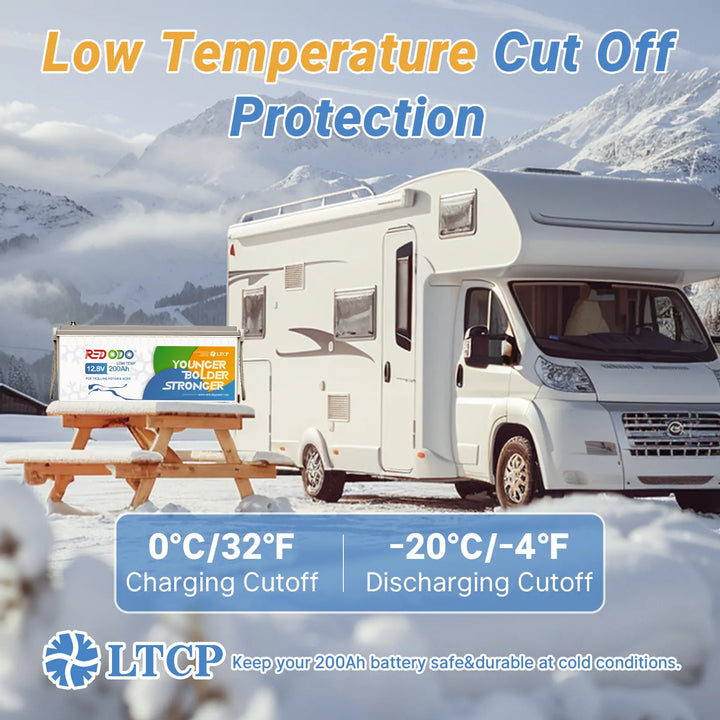

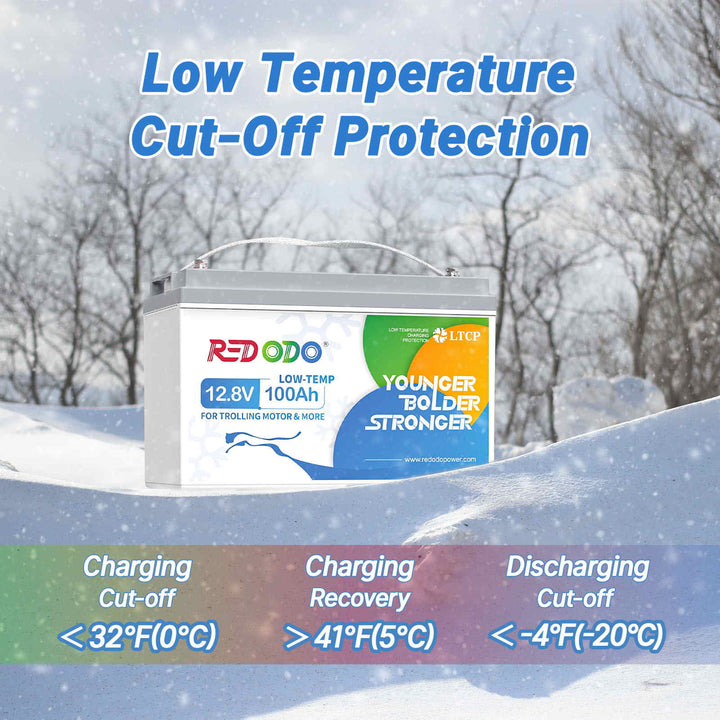


![⚡[$220 after Sign-Up] Redodo 12V 100Ah Lithium Trolling Motor Battery With Low Temp Protection](http://www.redodopower.com/cdn/shop/files/Redodo12V100Ahlow-tempbattery.webp?v=1738462317)

![⚡[$239 after Sign-Up] Redodo 12V 100Ah Group 24 Bluetooth LiFePO4 Battery | Real-Time Battery Monitoring | For RV, Marine, Solar](http://www.redodopower.com/cdn/shop/files/Redodo_12V_100Ah_group_24_bluetooth_lithium_battery.jpg?v=1744253032)
![⚡[$220 after Sign-Up] Redodo 12V 100Ah Group 31 Bluetooth Lithium Battery | Real-Time Battery Monitoring | For RV, Marine, Solar](http://www.redodopower.com/cdn/shop/files/redodo_12v_100ah_bluetooth.webp?v=1744698930)

![⚡[$294 after Sign-Up] Redodo 12V 140Ah Group 31 Lithium Battery with Bluetooth | 40% More Capacity | For RV, Marine, Solar Home](http://www.redodopower.com/cdn/shop/files/Redodo_12V_140ah_bluetooth_battery_ee6d5fd1-5c7d-4b9a-90ab-d54d06b29a04.jpg?v=1742967763)

![⚡[$450 after Sign-Up] Redodo 12V 280Ah LiFePO4 Battery | Low Temp Protection | For RV, Marine, Solar](http://www.redodopower.com/cdn/shop/files/Redodo12V280AhLowTempCutoffLiFePO4Battery.jpg?v=1741251504)